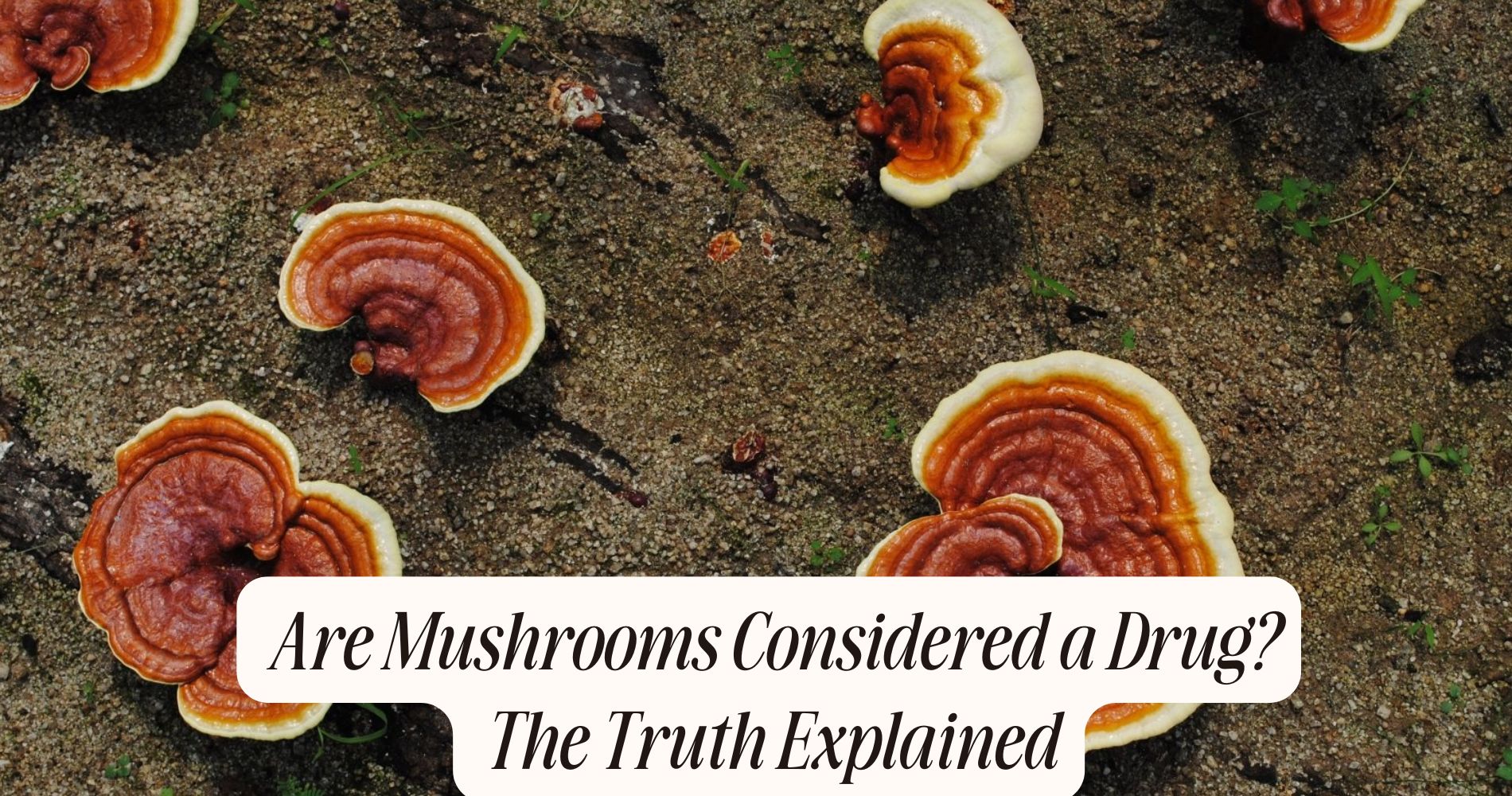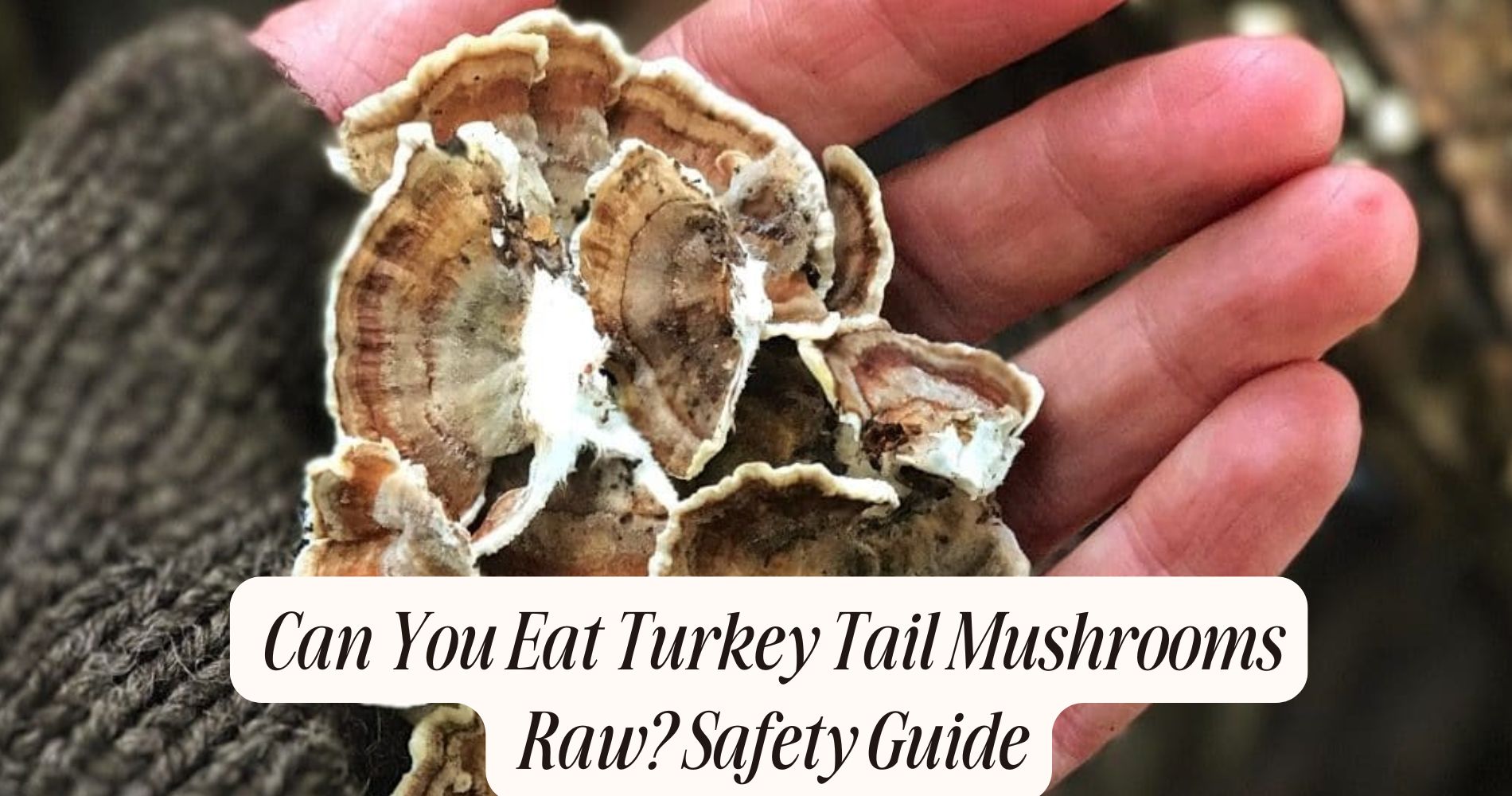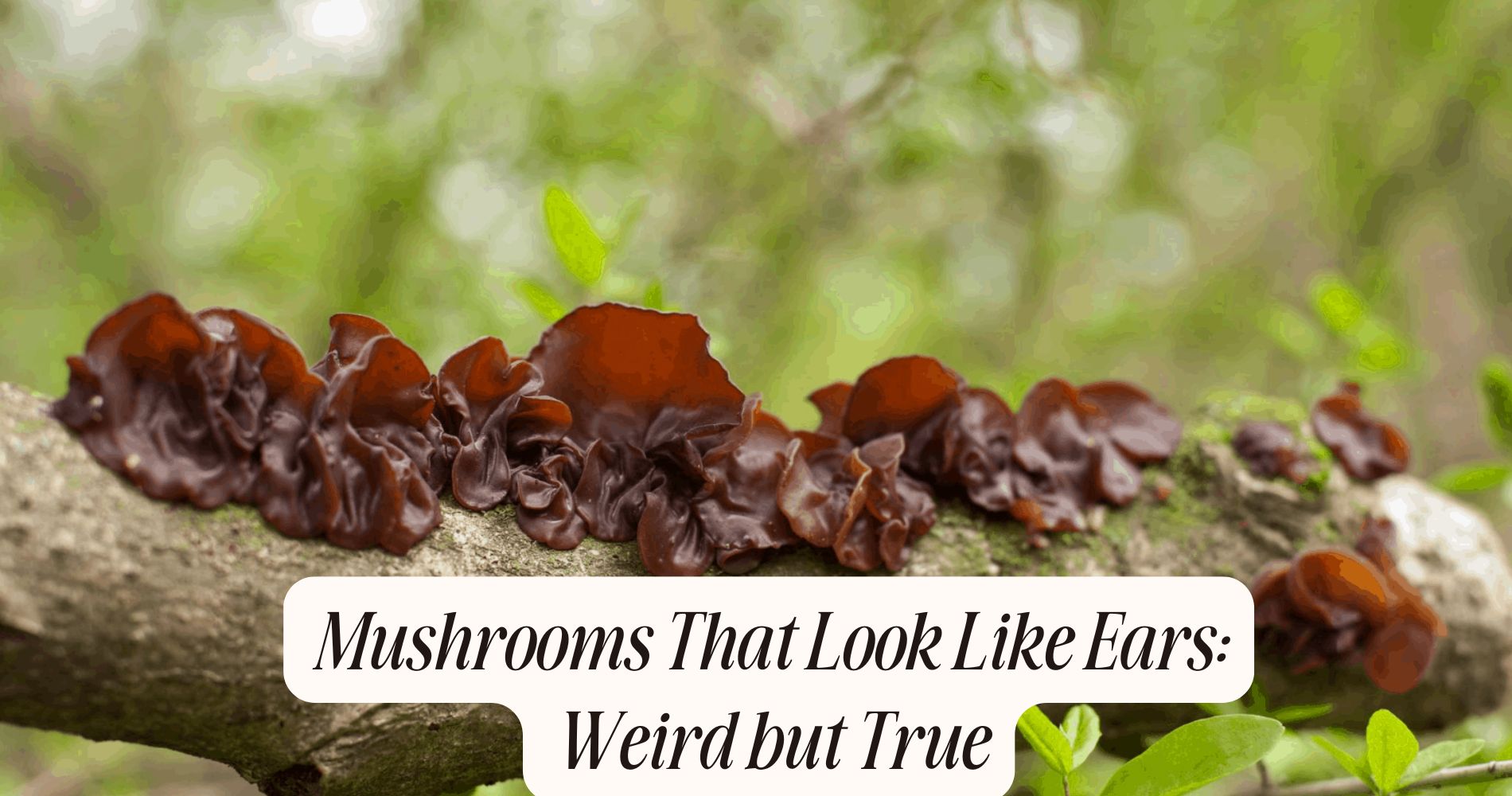
Are Mushrooms Considered a Drug? The Truth Explained
Are mushrooms considered a drug? Mushrooms can indeed be seen as a drug, especially the psychedelic types containing psilocybin. These mushrooms alter your perception and mood, providing unique psychological experiences. While edible varieties are mainly enjoyed for their taste and health benefits, like enhancing your immune system, psychedelic mushrooms can lead to significant emotional shifts. It's important to understand the differences between these types, including their legal status and potential health risks. The conversation around mushrooms is evolving, with new research highlighting both their therapeutic potential and societal misconceptions. Stick around to explore these facets further!
Understanding Mushrooms
Mushrooms, often seen as a culinary delight, hold fascinating properties that extend beyond the kitchen. To truly understand mushrooms, you need to explore their biology and ecology.
The biology of mushrooms involves their unique structure, which includes a network of mycelium, the vegetative part of fungi. This mycelium plays an essential role in nutrient absorption and reproduction.
In terms of ecology, mushrooms serve as important players in their ecosystems. They break down organic matter, recycling nutrients back into the soil.
You mightn't realize it, but these fungi form symbiotic relationships with plants, helping them absorb water and minerals more efficiently. This partnership is fundamental for the health of many ecosystems.
Mushrooms also interact with various organisms, influencing food webs and biodiversity. Understanding these dynamics can shed light on how mushrooms contribute to environmental stability and resilience.
By exploring mushroom biology and ecology, you not only appreciate their culinary uses but also recognize their significant role in maintaining ecological balance.
Types of Mushrooms
There's a remarkable variety of mushrooms, each with unique characteristics and uses. You'll find mushroom varieties ranging from the familiar button mushroom to the exotic chanterelle. Each type brings its own flavor profile and texture, making them essential in an array of culinary uses.
For instance, the button mushroom is widely used in salads, soups, and stir-fries due to its mild taste. Portobello mushrooms, on the other hand, are perfect for grilling and can even serve as a meat substitute in burgers. Shiitake mushrooms add a robust, umami flavor to dishes, making them favorites in Asian cuisine.

If you're feeling adventurous, try foraging for wild mushrooms like morels or porcini. Just remember to be cautious, as some varieties can be toxic.
In addition to their culinary applications, some mushrooms, like reishi and lion's mane, are celebrated for their potential health benefits.
Whether you're cooking at home or exploring specialty markets, the diversity of mushroom varieties offers endless possibilities for your meals.
Edible vs. Psychedelic
When exploring the world of mushrooms, it's important to distinguish between edible varieties and those with psychedelic properties.
Edible mushrooms, like shiitake, portobello, and button mushrooms, are commonly found in grocery stores and have various culinary uses. They're not only delicious but also packed with nutritional benefits, including vitamins, minerals, and antioxidants. These mushrooms can enhance your meals while contributing to a balanced diet.
On the other hand, psychedelic mushrooms, often referred to as magic mushrooms, contain compounds like psilocybin that can alter your perception and mood.
While they may have gained popularity in certain circles for their hallucinogenic effects, they lack the culinary appeal and nutritional benefits of their edible counterparts. Consuming these mushrooms isn't about enhancing a dish but rather about experiencing a profound psychological journey.
Effects on the Body
The differences between edible and psychedelic mushrooms extend to their effects on the body. When you consume edible mushrooms, you're likely to enjoy their nutritional benefits, including vitamins, minerals, and antioxidants. These mushrooms can boost your immune system, improve gut health, and even provide anti-inflammatory properties.
Their mushroom physiology supports overall wellness, making them a great addition to your diet.

On the other hand, psychedelic mushrooms, containing compounds like psilocybin, affect your brain chemistry and alter perception. You might experience visual distortions, heightened emotions, and altered thought processes. While some users report positive experiences, it's important to be aware of potential mushroom toxicity.
Certain mushrooms can cause harmful effects, leading to nausea, vomiting, or more severe health issues if ingested.
Recognizing the differences in effects between these two types of mushrooms is vital. Edible mushrooms promote health, while psychedelic varieties can lead to intense psychological experiences.
Always prioritize safety and do thorough research before consuming any type of mushroom to guarantee you're making informed choices for your body.
Legal Status of Mushrooms
Mushrooms occupy a complex legal landscape that varies considerably across different regions. In some places, mushrooms containing psilocybin are classified as Schedule I drugs, making their possession and use illegal.
However, you may find that there's been a growing movement towards mushroom legalization and decriminalization efforts in various parts of the world. Cities like Denver and Oakland have led the charge by decriminalizing psilocybin mushrooms, allowing citizens to possess and use them without facing criminal charges.
This shift reflects a broader trend, as more jurisdictions are recognizing the potential benefits of mushrooms and re-evaluating their legal status. On a federal level, the legal status of mushrooms remains unchanged, but ongoing research and public interest could influence future policies.
You should stay informed about local laws, as they can change rapidly. While some regions embrace mushroom legalization, others maintain strict prohibitions. Understanding these nuances will help you navigate the legal aspects of mushroom use.
Ultimately, the conversation around mushrooms is evolving, and the outcomes of decriminalization efforts could pave the way for broader acceptance and regulation.
Health Benefits and Risks
Exploring the health benefits and risks of psilocybin mushrooms reveals a fascinating duality. On one hand, these mushrooms can offer psychological benefits, including potential relief from anxiety, depression, and PTSD. Many users report enhanced creativity and introspection during their experiences, which can lead to meaningful personal insights.
Furthermore, psilocybin mushrooms have nutritional value, containing vitamins, minerals, and antioxidants that contribute to overall health.
However, it's essential to understand the potential toxicity associated with psilocybin mushrooms. While they're generally considered safe in controlled environments, consuming the wrong type or incorrect dosage can lead to adverse effects, such as nausea, paranoia, or anxiety.

Some individuals may also have underlying health conditions that could exacerbate these reactions. Additionally, the legal status of psilocybin mushrooms in various regions adds another layer of complexity to their use.
Ultimately, while psilocybin mushrooms can provide potential benefits, you should approach them with caution. Educate yourself on their effects, consult with professionals if needed, and prioritize safety to help guarantee a positive experience.
Current Research Insights
Current research on mushrooms reveals their fascinating psychedelic properties and potential medical applications.
You'll find that studies are increasingly highlighting benefits like anxiety reduction and improved mental health outcomes.
Understanding these insights can reshape how we view mushrooms in both recreational and therapeutic contexts.
Psychedelic Properties of Mushrooms
Psychedelic experiences often evoke profound insights and emotional shifts, and recent research has been uncovering the unique properties of certain mushrooms that contribute to these effects.
You might be surprised to learn that mushrooms containing psilocybin, a naturally occurring compound, have been a focal point in studies exploring their potential to facilitate spiritual journeys.
These mushrooms interact with serotonin receptors in your brain, leading to alterations in perception, mood, and consciousness. As a result, many users report experiencing enhanced creativity, a sense of connectedness to nature, and even encounters with what they describe as higher states of awareness.
Researchers highlight that these psychedelic experiences can lead to lasting changes in mindset, often promoting feelings of openness and empathy.
Current studies are investigating how these experiences might help individuals navigate complex emotional states, allowing for personal growth and deeper self-understanding.
While the scientific community continues to explore the extensive implications of these findings, it's clear that mushrooms with psychedelic properties hold significant intrigue for those seeking transformative experiences.
Whether for exploration or personal insight, the journey with these mushrooms can be as enlightening as it's fascinating.
Medical Applications and Benefits
Recent studies have revealed promising medical applications for psilocybin mushrooms, particularly in treating mental health disorders. Researchers are discovering that these fungal compounds possess significant therapeutic potential, especially for conditions like depression, anxiety, and PTSD.
In clinical trials, patients have reported substantial improvements in their mental well-being after undergoing psilocybin treatment.
You might be surprised to learn that psilocybin works by interacting with serotonin receptors in the brain, which can lead to altered perceptions and emotional breakthroughs. This psychedelic experience often helps individuals confront and process deep-seated issues, allowing for transformative healing.
Moreover, the growing body of evidence suggests that psilocybin could be effective in alleviating end-of-life anxiety for terminally ill patients. By facilitating a more profound acceptance of their circumstances, these individuals can experience a renewed sense of peace and purpose.
As research continues, it's clear that the therapeutic applications of psilocybin mushrooms are only beginning to be explored.
You might want to keep an eye on ongoing studies, as the potential benefits of these fungal compounds could reshape the future of mental health treatment.
Societal Perceptions and Misconceptions
When you think about mushrooms, what comes to mind?
Many people have strong opinions shaped by cultural views, legal status, and the ongoing debate between their psychedelic and medicinal uses.
Understanding these perceptions and misconceptions can help you navigate the complex landscape surrounding mushrooms as a drug.
Cultural Views on Mushrooms
However, the modern narrative often distorts these views, focusing on the potential dangers without acknowledging the benefits.
This can lead to fear and misunderstanding, making it harder for you to appreciate the multifaceted roles mushrooms play in diverse cultures.
Legal Status Overview
Often misunderstood, the legal status of mushrooms, particularly those containing psychoactive compounds, varies widely across different regions. You might assume that all mushrooms fall under the same mushroom classification, but that's far from the truth.
In some areas, specific types of mushrooms, like psilocybin mushrooms, are classified as illegal substances, strictly regulated under drug regulation laws. In contrast, other regions have begun to decriminalize or even legalize these mushrooms for therapeutic use.
This inconsistency often leads to misconceptions about their safety and potential. You might hear people argue that all mushrooms are dangerous or that their use is entirely permissible, but the reality is nuanced.

For instance, while some localities are seeing a shift towards more progressive policies regarding mushroom use, others maintain strict prohibitions. It's crucial to stay informed about your local laws and societal perceptions surrounding mushrooms.
Understanding the legal landscape can help you navigate the conversation more effectively, whether you're discussing their cultural significance or their potential for medical use.
Psychedelic vs. Medicinal Use
The distinction between psychedelic and medicinal use of mushrooms is a topic ripe with societal perceptions and misconceptions. Many people equate mushrooms solely with recreational use, focusing on the psychedelic experiences they can induce.
However, mushrooms also boast significant medicinal properties that have been recognized historically across various cultures. You mightn't realize that these fungi have a long history of use in traditional medicine, highlighting their cultural significance.
The therapeutic potential of mushrooms is gaining traction in modern medicine, especially for conditions like depression and PTSD. Yet, safety concerns arise when people self-medicate without understanding dosage guidelines.
The recreational use of psychedelic mushrooms often overshadows their medicinal benefits, leading to misunderstandings about their role in wellness.
While both uses can be valid, it's essential to approach them with caution. Educating yourself on the differences can help you appreciate the full spectrum of mushrooms, from their historical uses to their potential within a therapeutic context.
Enhance Your Wellness Naturally with SUPER MUSHROOM GUMMIES
If you're exploring the question "are mushrooms considered a drug?" and looking for a safe, health-focused option, Well Gummies' SUPER MUSHROOM GUMMIES are the perfect choice. These vegan gummies combine 10 functional mushroom types to deliver immune support, sharper focus, and steady energy—all without the complexities of drug-like effects. With a delicious fresh wild berry flavor, they’re easy to incorporate into your daily routine. Enjoy the natural benefits of mushrooms in a convenient, chewable form, free from jitters or crashes.
Frequently Asked Questions
Can Mushrooms Be Addictive Like Other Drugs?
Mushrooms can have psychological effects, but they're generally not considered addictive like other drugs. You likely won't experience withdrawal symptoms, as their use doesn't typically lead to dependence or cravings. Enjoy responsibly!
How Do Mushrooms Compare to Traditional Recreational Drugs?
When you compare mushrooms to traditional recreational drugs, you'll notice that mushroom effects vary greatly. Unlike many drugs classified as stimulants or depressants, mushrooms often produce altered perceptions and introspective experiences that can differ widely among users.
Are There Any Safe Ways to Use Mushrooms Recreationally?
When you're considering recreational mushroom use, prioritize responsible consumption. Follow dosage guidelines carefully to minimize risks and guarantee a safer experience. Always be aware of your surroundings and stay hydrated to enhance your enjoyment.
How Do Different Cultures View Mushrooms as Drugs?
Different cultures view mushrooms through varied lenses; some embrace their medicinal uses, while others see them as recreational substances. Your understanding will deepen as you explore these cultural perceptions and their historical significance in society.
What Is the History of Mushrooms in Drug Use?
Mushrooms have a rich history in drug use, often celebrated for their psychedelic properties. You'll find they hold cultural significance in various societies, where they're used for spiritual rituals, healing, and enhancing consciousness throughout centuries.
Conclusion
In summary, whether mushrooms are regarded as a drug depends on their type and use. While edible mushrooms offer health benefits, psychedelic varieties can alter perception and consciousness, leading to debates about their classification. It is crucial to understand the legal status and potential risks involved. As research continues to reveal their effects, societal perceptions are shifting. By staying informed, you can make educated decisions about mushrooms and their role in both health and recreation.




